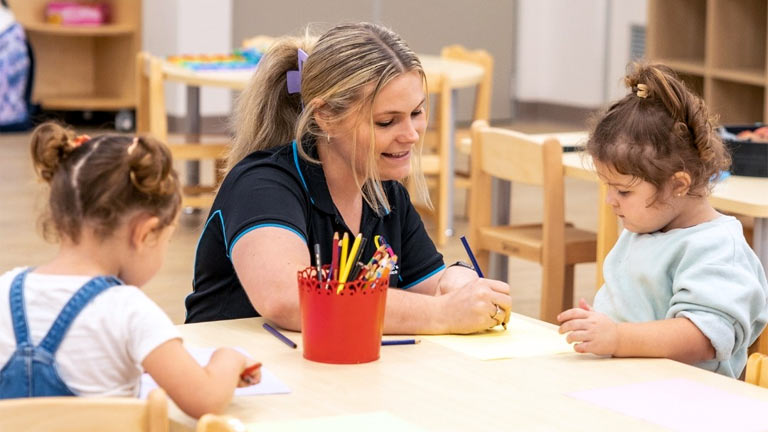 Being a parent is a blessing, but it comes with several tasks that you cannot imagine. Every day with a kid is different. You witness massive changes in them, and it gets tough to cope up with unusual situations. Many parents ask about emotional intelligence development in their children. It is an integral part of upbringing and being a responsible parent, and you must be wondering about it too. There are several schools of thought that you might have observed in your surroundings, and it is difficult to find the best ways to raise your kid. This article has covered everything for you. Scroll down and find out what emotional intelligence is, and how you can develop it in your child.
Being a parent is a blessing, but it comes with several tasks that you cannot imagine. Every day with a kid is different. You witness massive changes in them, and it gets tough to cope up with unusual situations. Many parents ask about emotional intelligence development in their children. It is an integral part of upbringing and being a responsible parent, and you must be wondering about it too. There are several schools of thought that you might have observed in your surroundings, and it is difficult to find the best ways to raise your kid. This article has covered everything for you. Scroll down and find out what emotional intelligence is, and how you can develop it in your child.
What Is Emotional Intelligence?
Emotional intelligence, EQ, or EI, refers to the effective management of emotions. It has three components; the ability to identify the emotions, the ability to harness them, and the ability to manage or regulate them.
EQ does not come overnight. Many people spend their entire lives, and they are unable to develop emotional intelligence. Being a parent, you would not want your kid to lack any skill. Before you teach them to be focused, develop emotional intelligence in them. You can nurture a good human at home because the better your kid knows to identify and manage emotions, the more comfortable he or she can survive and make others satisfied.
Steps For Developing Emotional Intelligence In Your Child
Emotional intelligence is two steps ahead of IQ and technical abilities. The world has been drooling over EI for a long time now. Here are the easiest steps that can help you develop emotional intelligence in your child.
- Observe Your Child
First things first; observe your child’s behavior before moving on to the other steps. You must know what your child feels and how he or she reacts to certain situations. Once you know their feelings, you can easily plan strategies to teach them identification and sound emotion management. You can also get some help from early childhood education programs to make this journey more comfortable.
- Identify The Feelings To Them
Now you are aware of your child’s emotions, and their reactions are known, you have to start explaining these emotions to them. The little one must understand what he or she feels. For example, if your child is angry at his or her sibling, let your kid know what the feeling is. Before teaching them to handle it, they should know what it is.
- Show Some Empathy
You must be empathetic towards your child. You can teach them empathy this way and efficiently teach them to harness and manage their emotions. For example, you can say, ‘I know you are hurt, but you can share your toys with your sibling to avoid any fights.’ This is a better method instead of ordering them to share. According to Forbes, intelligence is overrated, and it takes more EQ than IQ to be successful. Your child can be successful if you start developing EQ with empathy.
- Listen To Them And Respond
Listen to your kids’ problems before you respond or make any decisions. Let them express themselves correctly. Only then can you teach them not only to identify but find the best solutions to their problems. Once you have listened, never forget to respond. Kids wait for their parents to respond. It makes them confident that they are being respected and heard.
- Restrictions Are Important Sometimes
Every house has some ground rules, and so does your home. Never compromise on them no matter what happens. Your kid will learn discipline and the fact that rules must be respected and honestly followed. Some things are unnegotiable, and your kid must know that.
- Negotiate When They Need It
Do not forget to negotiate on the small things in life. Restrict them from the things that can harm them, but negotiate when you need it. If you have punished your child for not showing good behavior, so be it. But the duration of the punishment can be negotiated if your child behaves well. Otherwise, you might teach them rigidity.
- Apologies Are Not For The Little Ones Only
Apologies shouldn’t be restricted to the little ones. If you have yelled at your kid or said some bad things to them, apologize as soon as you can. Your kid will feel blessed and confident that his or her parents respect the feelings. Your child will also learn that apologizing for the wrong is a good thing no matter how old you get.
Conclusion
Parenting is not as easy as it sounds. It comes with several problems every day, and you have to face many challenges. Before you inject any knowledge about focus and good academics, teach them emotional intelligence. It will help them in their personal and professional life without any big obstacles. If you haven’t thought about it yet, start thinking now. You can teach them to be emotionally healthy, compassionate, kind, and empathetic towards their peers and others.




